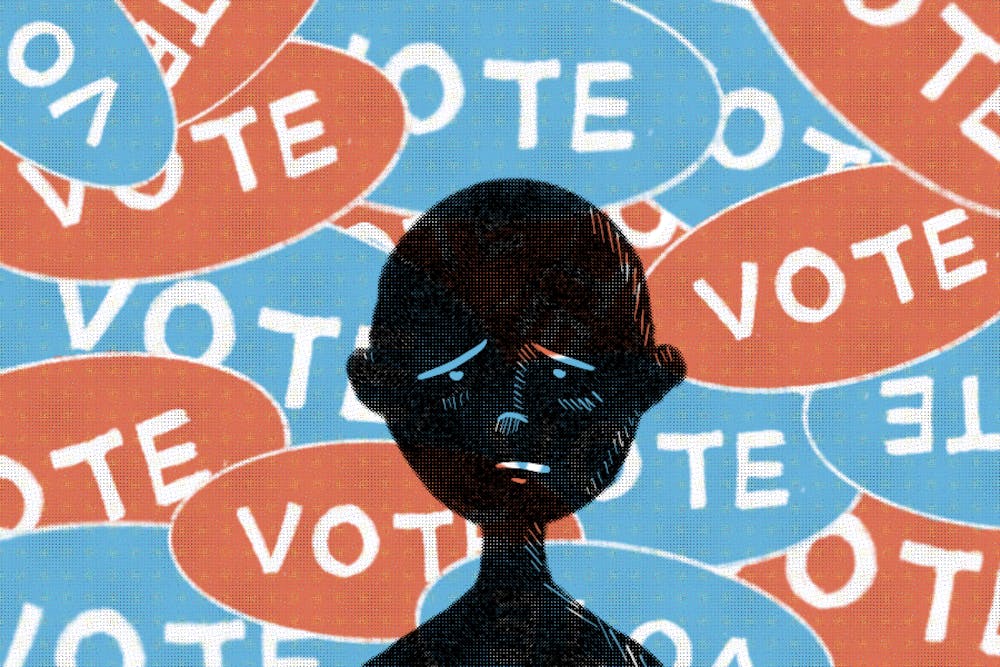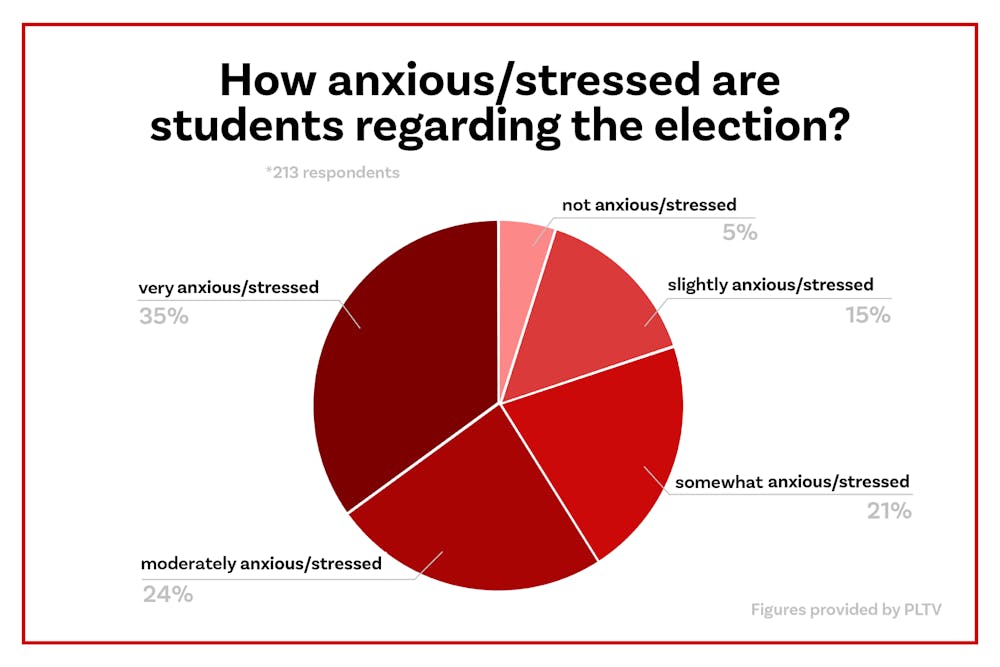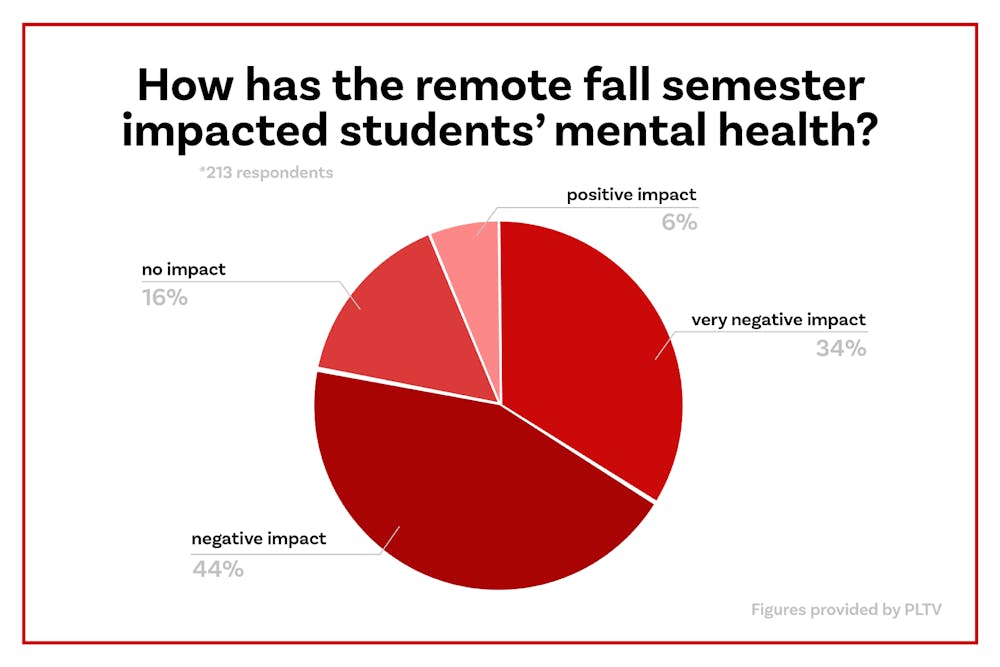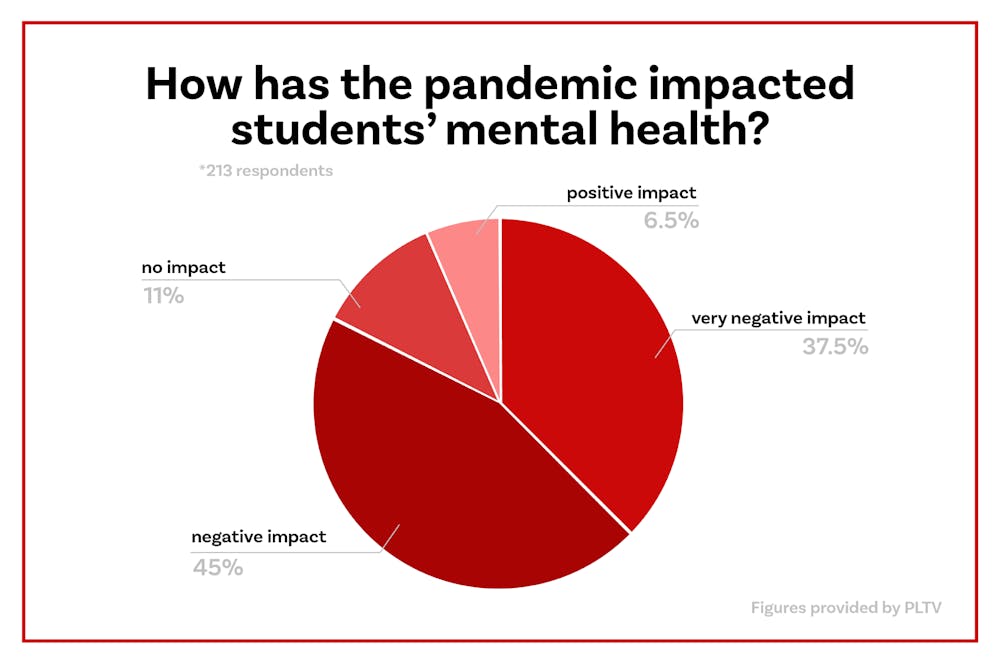
Amid an already tense year dominated by the COVID-19 pandemic and protests against systemic racism and police brutality, Penn students are reporting a decline in mental health due to the drawn-out presidential election.
Student-run, non-partisan voter engagement program Penn Leads the Vote conducted a survey on the effect of the 2020 election on students' mental health, and found that 80% of respondents reported that they were somewhat, moderately, or very anxious and stressed leading up to Election Day.
"The question was born out of reflecting on what happened during the summer, and how we saw that there were so many tensions across the United States, in terms of race, gender, and [other] social aspects, building up to a point where people could just no longer take it anymore," Engineering sophomore and PLTV research committee member Shivani Guha said. "We were very curious to see whether there was some kind of emotional effect on our well-being, alongside being civically engaged."
The survey, which was open from Oct. 22 to Nov. 3 and garnered a total of 298 responses, largely aimed to assess whether there is a correlation between civic engagement and emotional well-being. Sid Jaiswal, an Engineering senior and PLTV Research and Policy fellow, contextualized the survey's importance during both the COVID-19 pandemic and Penn's Year of Civic Engagement.
The survey also found that 83% of respondents were negatively or very negatively affected by the COVID-19 pandemic, and 78% of respondents were negatively or very negatively affected by the remote fall semester.

"Overwhelmed" was the word of the "Election Week" for College first-year Hayden Siesel and his peers.
"Maybe it's a cliché, but I was definitely overwhelmed," he said, referring to focusing on school work while dealing with the uncertainty surrounding the results of the election. "The fact that it [was] multiple days instead of one day is something that I should have expected, but didn't expect. It was a really weird dynamic."
Leading up to Election Day, Penn repeatedly refused student and faculty calls for the day off, citing stringent Pennsylvania state regulations that dictate the University's Academic Calendar, which is set three years in advance. While the University's elected Faculty Senate announced a resolution on Oct. 6, in which faculty were encouraged to make accommodations for students who wished to participate in election-related activities, the lack of standardization and enforcement rendered the initiative ineffective, according to students.
Siesel said that while some of his professors moved assignments around for Election Day, the accommodations did not align with the extensive period of time it ultimately took for a victor to be declared, forcing him to expend his energy on multiple assignments in the midst of uncertainty and anxiety as vote counts trickled in.
Between the recent police killing of Walter Wallace Jr., the subsequent protests, the election, limited social interactions, the demanding coursework on top of a canceled fall break, and adjusting to college as a first-year student, keeping up with his well-being has proven to be especially challenging for Siesel this semester.
"I knew [the transition to college] was going to be stressful, because I've heard from everyone that no matter how prepared you are, it's stressful, but I wasn't too concerned that I wouldn't be able to handle it," he said. "But I didn't think that everything going on would affect the transition as much as it has."
College junior Sim Kohli similarly found it difficult to focus on school work, overwhelmed by the stress and uncertainty of "Election Week." Though she felt relief when the results were finally called on Saturday, she now finds herself swamped with all the class work she was unable to complete that week due to the emotional turmoil brought on by the election.
"It felt like Penn pretended that nothing was going on, when there was a lot going on," she said, adding that some of her friends had a midterm the day after Election Day. "We were sitting there watching the election, really sad and really stressed, and they were still forced to study for a midterm. I don't know how anyone can be productive in that space."

While students found it difficult to juggle their academic responsibilities with the stress of the election, professors are also struggling to find that same balance.
Melissa Hunt, Psychology professor and associate director of Clinical Training in the Psychology department, wrote in an email to The Daily Pennsylvanian that many of her students lost significant amounts of sleep and were either stress-eating or not eating because of election-related anxiety.
She said she coped with election anxiety by going on daily runs, capping news watching at 10 p.m., and reading or watching television for fun to get her mind off of politics.
Hunt, who volunteered at the polls for 14 hours on Election Day, voiced her support for Election Day to be a national holiday, and urged students to be patient and prioritize self-care amid news of possible vote recounts.
"These are very uncertain, trying times," she wrote. "The best thing we can all do is be patient, manage our own anxiety proactively, let the legal vote count continue, and then move forward."
Even for students taking a leave of absence who do not have to worry about academic responsibilities this semester, the election proved to be extremely trying on their mental well-being. This was particularly the case for College junior Aidan Mayer Ahearn, who took the semester off to work for the Pennsylvania Democratic Party.
"I knew I was going to feel super intense and strong emotions once the election actually got started, but I didn't really understand the gravity of how heavy it was going to be, and how much of an impact it was going to have until I actually sat down and started watching results that first night," he said. "I felt it so heavily probably, in part, because I gave all my time to [the election] for a period of three and a half months."
Ahearn normally clocked 40 hours a week for the Pennsylvania Democratic Party, with work spilling over 60 hours a week in the weeks leading up to the election.
Dr. Michal Saraf, psychologist and senior clinical director of Penn's Counseling and Psychological Services, wrote in an email to the DP that many students expressed worry over the possibility of an election outcome that "could result in a reduced sense of physical and emotional safety," given public health concerns of the ongoing pandemic, as well as widespread instances of police brutality.

Saraf added that some students expressed concern with the impact of the election on their familial and interpersonal relationships with people of differing political beliefs and values — a common theme that Dr. Thea Gallagher, assistant professor of clinical psychiatry and clinic director of the Outpatient Clinic at the Perelman School of Medicine Center for the Treatment and Study of Anxiety, also noted.
In response, Gallagher highlighted the importance of setting boundaries with certain people if unproductive conversations feel inevitable, and being intentional about social media usage and news watching. She also urged professors to at least acknowledge how students have been affected by the election.
"I do think because how much [the election] is tied to mental health, it needs to be acknowledged that this is a tough time for people where emotions are high, and I think it's a little tone deaf if you don't acknowledge that at all," she said. "Ultimately, universities can be a great place to manage healthy and respectful dialogue if it can be mediated so people are made to feel safe and heard."
Sigal Ben-Porath, a professor of Education at the Graduate School of Education, voiced a similar sentiment, and offered her own guidance for how teachers should address what she labeled a "contentious" election with their students.
"Political tensions are common around elections, and in the current polarized environment, it is no surprise that they would come up in class," she wrote in an email to the DP. "It is important that instructors start by recognizing their own positions, emotions, and biases, and that they learn to make space in their classes for a diverse set of acceptable opinions."
Student organizers of Penn Wellness Week, a biannual event that features initiatives aimed to enhance Penn students' mental and physical health, chose the week after "Election Week" to hold this semester's programming in hopes of alleviating students' election-related stress. The programming, which include wellness workshops over Zoom, outdoor bootcamp, and a virtual chess tournament, are running from now until Nov. 14.
The Daily Pennsylvanian is an independent, student-run newspaper. Please consider making a donation to support the coverage that shapes the University. Your generosity ensures a future of strong journalism at Penn.
Donate



